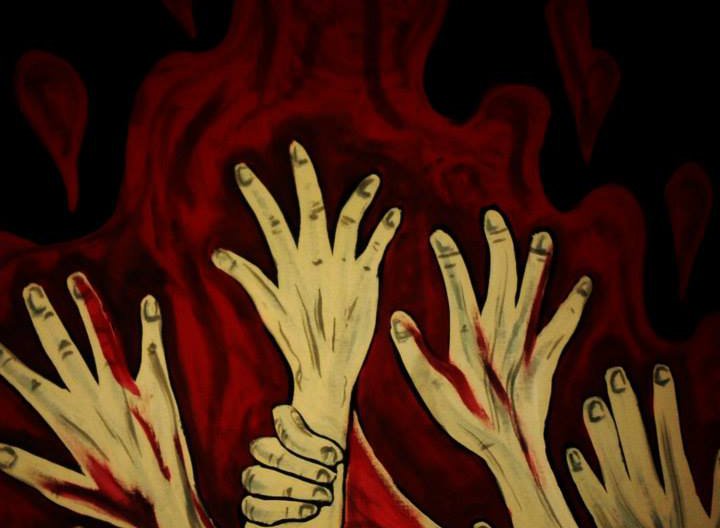 |
| Illustration by Keera Ratnam |
May 18 is etched deep into the conscience of the Tamil nation. On this day Eelam Tamils across the world remember the tens of thousands of Tamil civilians and combatants that were killed in Sri Lanka’s armed conflict. On this day the nation stands together, mourning the lives lost and marking the end of the armed movement - the most significant chapter of the Tamil resistance struggle till then. Yet on this day, while Tamils mourn, the Sinhala south celebrates. The defeat of 'terrorism' by its armed forces who committed mass atrocities against the Tamil people, and the seeming victory of Sinhala nationalism over Tamil nationalism, is marked by jubilation. It is a day in which the divisions on the island are laid bare, even more than usual. Six years on, the evidence of mass atrocities committed by the Sri Lankan state is conclusive, with reports, including by the UN, finding these crimes occurred. This is expected to be reconfirmed by the OISL in September, when it is due to present the findings of its investigation.
Tamils on the island are marking their first Mullivaikkal remembrance day under a new government. The easing of some restrictions on the North-East has resulted in sustained protests in the months since the Sirisena-government took power. The cautious optimism felt by Tamils led to the planning of public remembrance events, unlike the secret memorials of previous years. Democratically elected members of the Northern Provincial Council, at the invitation of Chief Minister Wigneswaran, and the Tamil National People’s Front, attempted to remember those who died in the war with memorial events in Mullivaikkal - the site which saw the worst of the atrocities. However, the new government responded by issuing a ban on the memorial. Mullaitivu Magistrate Court prohibited all events to commemorate the dead in Mullivaikkal. Tamils across the world have reacted with dismay and outrage at the new government’s renewed curtailing and restricting of the Tamil right to remembrance. Despite some reforms enacted by the government, which have been welcomed by many, the ban chips away at the already fragile hope of reconciliation between the Tamils and Sinhala south.
The restriction is particularly dismaying given the new president, Maithripala Sirisena’s pledge on Sri Lanka’s independence day, to work to bring the people of the north and south together. In an apparent reconciliatory act, the government this week announced that ‘Victory Day’ would be marked as a ‘national remembrance day’, where all civilian victims, regardless of ethnicity, were remembered as ‘Sri Lankans’. Quite apart from the imposition of a ‘Sri Lankan’ remembrance following a fundamentally unresolved ethnic conflict, the government had announced only days earlier, that the same day would also be commemorated as ‘War Hero’s Commemoration Day’, to remember Sri Lanka’s almost entirely ethnic Sinhala army. In line with Rajapaksa’s rule, the President Sirisena will be attending a military parade in the southern city of Matara.
Despite the government’s apparent willingness to acknowledge Tamil civilian deaths through the renaming of the day, the police, military and ministers have warned Tamils that the commemoration of fallen LTTE cadre remains prohibited. Indeed the police this week vowed to ensure such events did not take place. Such a prohibition is untenable with genuine reconciliation however, and ensures wounds of the past remain unhealed. For the Tamil nation, remembrance of the LTTE is intrinsically linked to May 18. These men and women were the sons and daughters, and brother and sisters of the Tamil people. Countless of them, including those who were witnessed to have surrendered to government forces, remain unaccounted for or are now known to have been executed as they held their white flags. The right of their families to mourn their loss and remember their lives must not be denied.
Without meaningfully addressing issues that lie at the core of the Tamil psyche - principally the massacre of the tens of thousands - reconciliation will remain elusive. The denial of basic rights, such as the remembrance of their dead, continues to send a message of contempt to Tamil sentiments. The Tamil people must be allowed to commemorate their dead on their own terms. Compulsion in commemoration will continue to widen the ethnic divide. Sri Lanka’s government continues to exacerbate divisions by engaging in policies designed to appeal to the Sinhala masses. Only an atmosphere of mutual understanding, where Tamils are allowed to grieve and mourn their loss openly, will allow for wounds to heal and respect between the communities to grow. The government is yet to prove it is serious about reconciliation. Its latest moves do not augur well for prospects of genuine accountability, a prerequisite for a sustainable political solution to the conflict.
